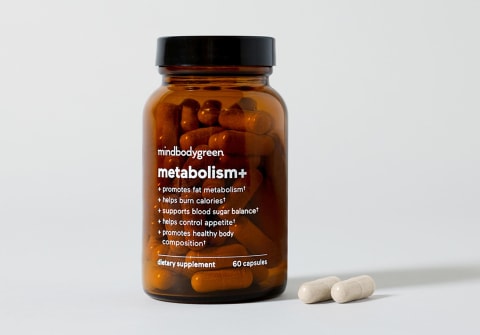Advertisement
Diabetes Cases On Track To Double — Are You Supporting Your Metabolism?


A review published by The Lancet predicted more than 3.1 billion people1 across the globe will be living with diabetes by the year 2050—that’s more than double the amount of cases in 2021 (529 million).
Type 2 diabetes (T2D) is expected to contribute to this astronomical shift. In the U.S. alone, the number of T2D causes in young people has doubled over the last two decades with Black and Indigenous Americans populations more susceptible.
Why diabetes cases are rising worldwide
There are three main types of diabetes: type 1 (which is typically diagnosed in children and young adults), type 2, and gestational (diabetes during pregnancy). Accounting for 90% of all diabetes cases1 in 2021, type 2 diabetes is the most common form.
According to researchers, this burden of T2D cases can be attributed to social risk factors that promote excessive weight gain and amplify metabolic health issues. Some of these risk factors include:
- Dietary risks (heavily processed carbohydrates, trans and saturated fats, added sugars, and processed meats)
- Lack of physical activity (i.e., fewer than 150 minutes per week)
- High BMI
- Tobacco use
- Alcohol use
While these numbers are shocking (and honestly, quite terrifying), there’s some optimism to be shared: Type 2 diabetes is preventable.
That said, we’re dealing with a metabolic health crisis in the United States and around the world.
So, accepting the “obesogenic way our environments are designed and the inequitable way we organize our resources and societies,” as researchers from the Lancet review so eloquently put it, is not an option if we’d like to optimize the metabolic well-being of humanity moving forward.
6 ways to enhance your metabolic health
Thankfully, there are a number of things you can do on a daily basis to support your metabolism and help prevent type 2 diabetes:
- Eat a nutritious diet: Eating a whole foods-based, nutrient-rich diet is crucial for a healthy metabolism. Prioritize complex carbs, lean protein, healthy fats, and plenty of plant foods, herbs, and spices to promote satiety, balance blood sugar, maintain healthy lipid levels, and support fat metabolism.
- Take a metabolism-supporting supplement: To enhance your metabolism holistically, you may consider incorporating a high-quality metabolism supplement into your daily routine. Of course, supplementation is most effective when combined with a healthy lifestyle that prioritizes mindful nutrition, regular physical activity, and other holistic metabolic well-being practices.
- Move your body regularly: Strength exercises help to build and maintain muscle mass, which directly affects your metabolic rate; higher muscle mass leads to increased calorie expenditure (even at rest). Incorporating cardio activities into your weekly routine is essential for supporting metabolism and overall longevity. Both aerobic exercises (e.g., running, walking, swimming, biking, hiking) and anaerobic activities (e.g., weightlifting, HIIT) can elevate your heart rate, burn calories, and contribute to a balanced fitness regimen.
- Get adequate sleep: According to a 2021 observational study, adults with overweight or obesity who had better sleep health experienced greater weight and fat loss.2 Sufficient sleep helps combat oxidative stress, balance hormones, and regulate various metabolic processes. If you’re aiming to optimize your metabolism, improving your sleep routine is an excellent starting point.
- Stay properly hydrated: Water plays a vital role in the metabolic reactions occurring within your cells (e.g., energy production, immune pathways, hormone signaling, and more). An extensive review published in Frontiers in Nutrition in 2016 highlighted that consuming water can even initiate water-induced thermogenesis, a process that has been observed to elevate your metabolic rate by as much as 30%3 for a duration of one hour.
- Try meditation: A 2018 study published in CNS Neuroscience & Therapeutics revealed that healthy adults who practiced meditation for eight weeks experienced notable enhancements in their metabolic profile—including significant reductions in total cholesterol, triglyceride, and blood glucose levels. The connection lies in the influence of stress (cortisol) on metabolism. Researchers have discovered that incorporating mindfulness practices like meditation can lower baseline stress levels and contribute to improved overall metabolic well-being.
The takeaway
The number of worldwide type 2 diabetes cases is rapidly increasing. To help prevent T2D (and other metabolic health issues), consider incorporating some of these habits into your daily well-being regimen.
Watch Next
Enjoy some of our favorite clips from classes
Enjoy some of our favorite clips from classes
What Is Meditation?
Mindfulness/Spirituality | Light Watkins
Box Breathing
Mindfulness/Spirituality | Gwen Dittmar
What Breathwork Can Address
Mindfulness/Spirituality | Gwen Dittmar
The 8 Limbs of Yoga - What is Asana?
Yoga | Caley Alyssa
Two Standing Postures to Open Up Tight Hips
Yoga | Caley Alyssa
How Plants Can Optimize Athletic Performance
Nutrition | Rich Roll
What to Eat Before a Workout
Nutrition | Rich Roll
How Ayurveda Helps Us Navigate Modern Life
Nutrition | Sahara Rose
Messages About Love & Relationships
Love & Relationships | Esther Perel
Love Languages
Love & Relationships | Esther Perel
What Is Meditation?
Box Breathing
What Breathwork Can Address
The 8 Limbs of Yoga - What is Asana?
Two Standing Postures to Open Up Tight Hips
How Plants Can Optimize Athletic Performance
What to Eat Before a Workout
How Ayurveda Helps Us Navigate Modern Life
Messages About Love & Relationships
Love Languages
Advertisement

Yes, There's A Longevity Vitamin (& People Over 40 Need To Prioritize It)
Molly Knudsen, M.S., RDN

Study Investigates How Fasting Impacts Sleep, Hormone Health & More
Gretchen Lidicker, M.S.

Yes, There's A Longevity Vitamin (& People Over 40 Need To Prioritize It)
Molly Knudsen, M.S., RDN

Study Investigates How Fasting Impacts Sleep, Hormone Health & More
Gretchen Lidicker, M.S.

Yes, There's A Longevity Vitamin (& People Over 40 Need To Prioritize It)
Molly Knudsen, M.S., RDN

Study Investigates How Fasting Impacts Sleep, Hormone Health & More
Gretchen Lidicker, M.S.

Yes, There's A Longevity Vitamin (& People Over 40 Need To Prioritize It)
Molly Knudsen, M.S., RDN

Study Investigates How Fasting Impacts Sleep, Hormone Health & More
Gretchen Lidicker, M.S.















